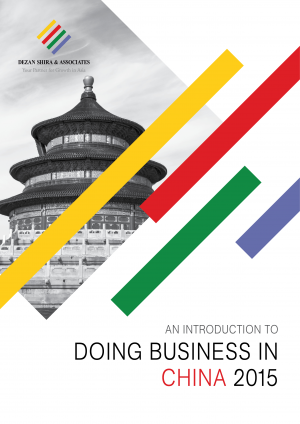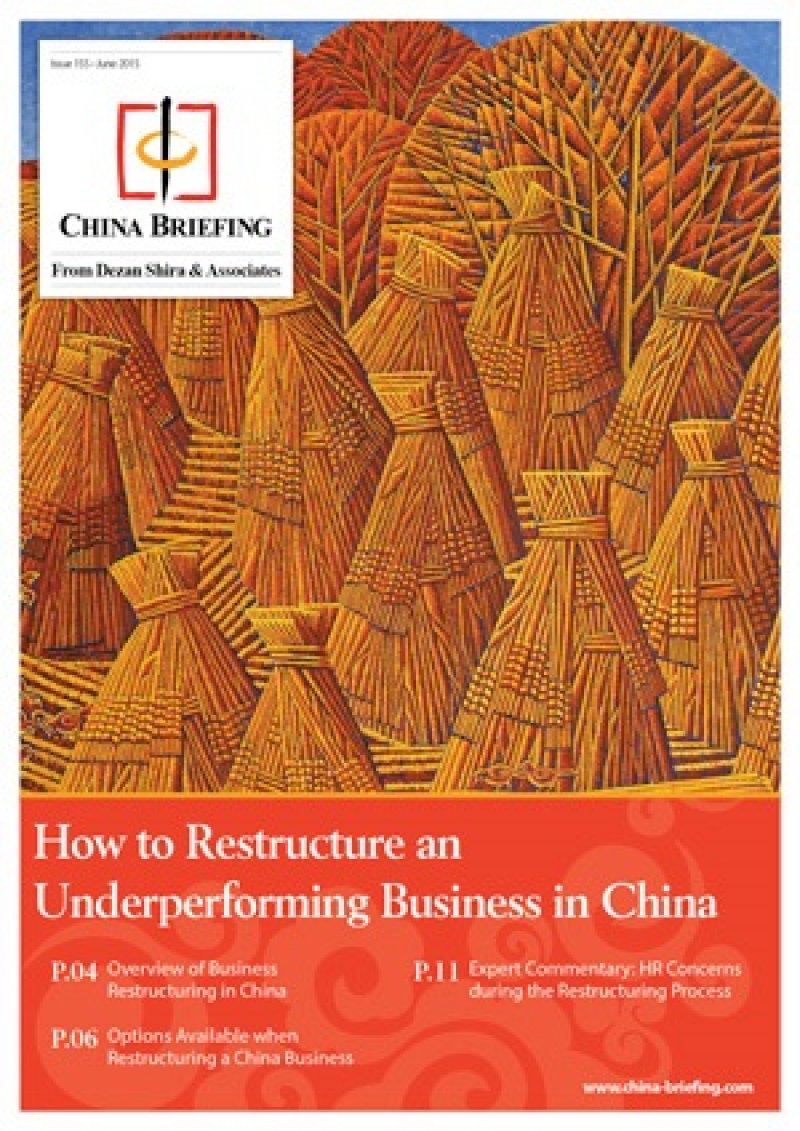The Shanghai and Guangdong Free Trade Zones: A Comparison
 By Elizabeth Leclaire and Rainy Yao
By Elizabeth Leclaire and Rainy Yao
Closely mirroring the structural and legislative policies of the Shanghai Free Trade Zone (FTZ), the Guangdong Free Trade Zone was launched in April of this year, along with two other FTZs in Tianjin and Fujian. With Shanghai as the nation’s de facto financial center and Guangdong as one of the world’s major manufacturing and trading centers, both the Shanghai FTZ and Guangdong FTZ have caught the attention of foreign investors seeking to enter a more liberalized Chinese market. While the Shanghai FTZ and Guangdong FTZ are regulated by similar policies, important distinctions exist between the two zones, and foreign investors must be careful to select the location best suited for business needs.
Geographical and Industrial Comparison
The Shanghai and Guangdong Free Trade Zones are of comparable size, with the Shanghai FTZ encompassing 120.27 meters squared and the slightly smaller Guangdong FTZ covering 116.2 meters squared. The Shanghai FTZ recently expanded to include larger portions of the city and is currently divided into three sections: Lujiazui – the city’s financial district, Jinqiao, and Zhangjiang – the city’s high-tech district. The financial leasing industry is one of the most popular and promising industries in the Shanghai FTZ. To date, more than 400 financial leasing companies have been established within the zone with a total registered capital of more than RMB 30 billion.
Similarly, the Guangdong FTZ is split into three subdivisions: Guangzhou Nansha New District, Shenzhen Qianhai Shekou, and Zhuhai Hengqin New District. The Guangzhou Nansha New District was established to allow for liberalized foreign investment in finance, shipping, logistics, and international trade. The Zhuhai Hengqin New District focuses on tourism, recreation, and technology.
Restrictions and Opportunities Comparison
The FTZs in China all follow the same “negative list”, a document detailing the industries where foreign investment is restricted or prohibited. Foreign investment in any sector outside the negative list is treated on par with domestic investment. That said, both the Shanghai and Guangdong each come with their own exclusive concessions.
Benefits of the Guangdong FTZ
Preferential Policies for Hong Kong and Macau
One of the greatest differences between the Shanghai FTZ and Guangdong FTZ lies with the policy regulating investment from Hong Kong and Macau. For the purposes of the Negative List, investors from Hong Kong and Macau are treated the same as foreign investors. However, as the Guangdong FTZ aims to strengthen integration between Hong Kong, Macau and Guangdong, which is directly adjacent to the two territories, investment from these two jurisdictions is liberalized to a larger extent. For example, foreign law firms are largely restricted in their ability to practice law in China, and need to work through a local law firm. Law firms from Hong Kong or Macau may however establish limited liability partnerships with Chinese entities to fully provide legal services in mainland China.
Other special policies for Hong Kong and Macau Investors include:
- Hong Kong and Macau service providers are allowed to set up wholly foreign-owned international shipping enterprise within the FTZ
- Hong Kong and Macau service providers may set up intermediary service institutions for studying abroad at one’s own expenses within the FTZ
- Hong Kong/Macau-invested travel agencies (capped at a number of five, separately) are allowed to provide overseas group travel services (with the exception of Taiwan)
- Hong Kong/Macau investors are allowed to provide high-end medical services and launch pilot schemes to exchange patients among one another
- Hong Kong/Macau-invested non-financial institutions are allowed to provide third-party payment services
As of July 13th, 2015, investors currently operating or building operations in the Guangdong FTZ’s Nansha New District or Hengqin New District may now also borrow RMB funds from Hong Kong or Macau, compared to the previous restriction of borrowing RMB only from within mainland China.
![]() RELATED:China Regulatory Brief: Guangdong FTZ to Allow Crossborder RMB Loans
RELATED:China Regulatory Brief: Guangdong FTZ to Allow Crossborder RMB Loans
Tax Policies
Though not applied to the other parts of the Guangdong FTZ, eligible enterprises located in the Qianhai Development Zone and Hengqin New area are able to enjoy a reduced corporate income tax rate of 15 percent, which is very close to what is offered in Hong Kong and Macau. Specifically, investors engaged in technology services, modern logistics, the creative industry and information services are eligible for the tax incentives. The preferential tax policies will last until December 31, 2020.
Benefits of the Shanghai FTZ
Visa Policies
In order to attract more foreign investment, Shanghai has sought to lessen restrictions for foreigners seeking visa or residence permits, particularly within the Free Trade Zone. Starting in the end of September, foreign qualified individuals may receive employment offers by Shanghai FTZ companies via electronic invitation, and will be provided port visas upon arrival. Under the new regulations, companies based in the Shanghai FTZ may also arrange exit and entry proceedings directly with China’s Exit and Entry Bureau.
![]() RELATED: China Makes Changes to Visa and Permit Policies to Attract Foreign Talent
RELATED: China Makes Changes to Visa and Permit Policies to Attract Foreign Talent
Special Preferential Policies for Financial Leasing Companies
As mentioned above, financial leasing industry is one of the biggest industries in the Shanghai FTZ. To keep its leading position, the following preferential policies have been implemented exclusively in the Shanghai FTZ:
- Financial leasing companies are allowed to conduct commercial factoring businesses that are relevant to their main business.
- Support overseas financial leasing, encourage different types of financial leasing companies to expand the cross-border use of RMB.
- Financial leasing companies may open a special account for cross-border RMB and are free to borrow money overseas.
- Financial leasing companies seeking to provide external guarantees are no longer required to obtain the pre-approval with the State Administration of Foreign Exchange.
- Foreign-invested financial leasing companies may make foreign exchange account settlement at their own discretion.
- Financial leasing companies in the zone are freed from quota restrictions on foreign lending and can open special foreign-lending accounts at local banks. This type of account can be used to retain leasing revenue from overseas and is subject to a simplified settlement procedure.
- The Shanghai FTZ is charged with handling the approval procedures for the establishment of foreign-invested financial leasing companies whose registered capital is less than US$ 300 million. The processing procedure normally takes five business days.
Conclusion
As China continues to expand FTZ locations and decrease investment restrictions, accessibility to China’s economy increases for foreign investors. However, with growing foreign investment opportunities also comes key market differences across China’s FTZs. Due to their size and location, the Shanghai FTZ and Guangdong FTZ are of particular appeal to investors, and foreign companies must take care when determining the most appropriate zone to establish operations.
|
Asia Briefing Ltd. is a subsidiary of Dezan Shira & Associates. Dezan Shira is a specialist foreign direct investment practice, providing corporate establishment, business advisory, tax advisory and compliance, accounting, payroll, due diligence and financial review services to multinationals investing in China, Hong Kong, India, Vietnam, Singapore and the rest of ASEAN. For further information, please email china@dezshira.com or visit www.dezshira.com. Stay up to date with the latest business and investment trends in Asia by subscribing to our complimentary update service featuring news, commentary and regulatory insight.
|
![]()
 An Introduction to Doing Business in China 2015
An Introduction to Doing Business in China 2015
Doing Business in China 2015 is designed to introduce the fundamentals of investing in China. Compiled by the professionals at Dezan Shira & Associates, this comprehensive guide is ideal not only for businesses looking to enter the Chinese market, but also for companies that already have a presence here and want to keep up-to-date with the most recent and relevant policy changes.
How to Restructure an Underperforming Business in China
In this issue of China Briefing magazine, we explore the options that are available to foreign firms looking to restructure or close their operations in China. We begin with an overview of what restructuring an unprofitable business in China might entail, and then take an in-depth look at the way in which a foreign company can go about the restructuring process. Finally, we highlight some of the key HR concerns associated with restructuring a China business.
 Revisiting the Shanghai Free Trade Zone: A Year of Reforms
Revisiting the Shanghai Free Trade Zone: A Year of Reforms
In this issue of China Briefing, we revisit the Shanghai FTZ and its preferential environment for foreign investment. In the first three articles, we highlight the many changes that have been introduced in the Zone’s first year of operations, including the 2014 Revised Negative List, as well as new measures relating to alternative dispute resolution, cash pooling, and logistics. Lastly, we include a case study of a foreign company successfully utilizing the Shanghai FTZ to access the Outbound Tourism Industry.
- Previous Article Smoothly Converting from an RO to a WFOE: Employee Transfer and Timing
- Next Article China’s Growing Ties with ASEAN Opens up New Opportunities for Foreign Investment



























